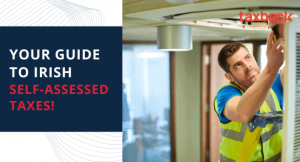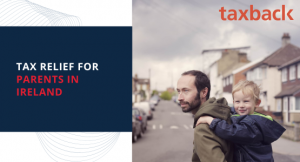The A-Z of income tax refunds in Ireland
Whatever the weather, it's always worth checking if you're due a tax refund!
Tax is a tricky subject! You could be easily confused about where to start when it comes to filing your Irish tax return and claiming your tax refund.
Don't worry! Taxback is here to help you to claim your tax rebate in Ireland!
We've put together this handy A-Z guide of everything you need to know on income tax refunds in Ireland!
Download your FREE Irish Tax Guide

Average refund
The average Irish Taxback customer gets over €1,880 in tax back.
When you file with us, you will ensure you claim your maximum legal refund!
The average Irish tax refund is €1,880
Bands (Tax rate bands)
This is the amount of income that is taxed at a certain percentage or tax rate.
Currently in Ireland, the first portion of your income is taxed at a standard rate of 20% and the remainder at a higher rate of 40%.
The income band that you pay tax on will depend on the amount you earn and your circumstances - marital status, if you have children etc.
Credits
There are a number of tax credits that you may be eligible to claim, for example, employee tax credit, single person tax credit and married person tax credits.
Some tax credits are applied automatically(employee tax credit), whereas others must be applied for - dependent relative tax credit, for example.
Tax credits can reduce your tax bill so it is definitely worth investigating which tax credits your entitled to!
Download your FREE Irish Tax Guide
Dependent
If you care for a dependent relative – you may be entitled to the Dependent Relative Tax Credit!
For tax purposes, a dependent is defined as an individual who relies on another person. This may be a child, an older person or a disabled individual.
The value of this credit was increased in Budget 2021 from €70 to €245. In order to qualify for this tax credit the relative you claim for must be your own or your civil partner's or spouse's:
- relative who is unable to take care of themselves due to old age or ill-health
- widowed mother or father, incapacitated or not (regardless of if the surviving parent was married or in a civil partnership)
- child who lives with you and on whose services you depend as a result of your age or ill health
Emergency Tax
When you start a new job, your employer may deduct tax on an emergency basis and your first few payslip could be subject to higher tax rates than normal!
The good news is this is largely avoidable!
The even better news is that if you pay this tax you can claim it back!
To make sure you don't pay emergency tax you should:
- Provide your new employer with your PPSN
- Register with revenue
For more details, check out our emergency tax blog.
Flat rate expenses
If you work in a certain occupation, you may be entitled to flat rate expenses. These are tax reliefs or credits that can reduce your tax bill!
The aim of flat rate expenses is to cover some work-related expenses like equipment and uniforms.
For example, if you are a shop assistant you are entitled to flat rate expenses of €121 or if you are a hotel waiter or waitress you are entitled to €80 in flat rate expenses.
Many people are not aware that the flat rate expenses deduction is not automatic and so you must claim it.
For more details, check out our flat rate expenses blog.

Gross Income
This is the income you earn before any tax deductions are taken like USC, PAYE or PRSI. The income you take home after deductions is known as Net Income.
Help to buy incentive
This government initiative allows first time buyers to get an income tax rebate of 5% on the purchase of a newly built home up to the value of €400,000.
The maximum rebate is €20,000!
Check out our blog for more details on the help to buy incentive.

Income tax
If you earn income in Ireland, your earnings will be subject to income tax. The rates at which you pay income tax will depend on your income.
Joint Assessment
Many married couples and civil partners choose to be jointly assessed for tax purposes. And there are many benefits to this.
With this, you and your civil partner/spouse will pay tax on your combined income. Joint assessment allows you to split your tax credits and rate band with your partner.
One spouse/partner will act as the assessable spouse/civil partner, taking responsibility for paying tax. This is often the spouse with the higher income.
If you and your spouse/partner choose to be assessed jointly, you must inform Revenue before 31 March in the assessment year.

Keep your receipts!
It's advisable to keep all of your important receipts for six years, just in case the taxman comes calling and you are required to provide proof of expenses!
Why not invest in a good binder to keep your receipts together and stored safely?

Leaving Ireland
If you are leaving Ireland to work in another country, you can avail of Split Year Treatment.
This means when you move abroad you won't get taxed on the same income in both Ireland and the country you move to.
You will only pay tax in Ireland for income you earn here and you will pay tax on income earned abroad in the country you move to. This applies solely for employment income.
For more details on Split Year Treatment, check out our blog!
Medical expenses (Med1 / Med 2)
If you are a PAYE or self-assessed worker, you are entitled to claim tax relief on qualifying medical and dental expenses you have paid for!
In order to claim this tax relief, you must fill out and submit a Med 1 form for medical expenses and a Med 2 for dental expenses.
For more details on claiming tax relief on medical and dental expenses, check out this blog.
Nursing home expenses
You can claim tax relief on nursing home expenses that you pay for yourself or someone else. This tax relief is given at the higher rate of income tax you pay up to 40%.
This relief can be claimed at the end of the year and in some cases throughout the year- if the nursing home provides qualified nursing care onsite on a 24 hour basis.
Online (applying online)
You can apply for your tax refund online with Taxback today!
Payslip
Your payslip is a statement of your earnings that will be given to you by your employer on a weekly/monthly basis.
Your payslip details your gross and net income, deductions, tax credits and other relevant information.
Download your FREE Irish Tax Guide
Questions
If you have any questions about tax returns in Ireland or tax refunds, why not contact the Taxback live chat team. The team of qualified tax experts is available to provide support 24/7!
Rent a room relief
Kids flown the nest? That spare bedroom idle? If so this could be an excellent opportunity to earn some extra income tax free!
In fact, if you rent a room in your home, you may be able to claim Rent a Room Relief which can entitle you to earn up to €14,000 tax free.
For more details about the Rent a Room Relief scheme check out our blog 6 Facts about Rent-a-Room Relief You NEED to Know.
Standard Rate Cut Off Point
The amount of money you earn before you have to pay the higher rate of income tax is known as the standard rate cut off point. Any income higher than this amount is taxed at the higher rate of 40%.
Tuition fees
Whether you are a student or a parent, if you have paid college tuition fees you can benefit from tax relief on these fees.
This tax relief is available for those who have paid fees for eligible college courses including
- Undergraduate
- Postgraduate
- IT and foreign languages courses.
The tax relief is granted at 20% on fees up to €7,000.
To find out more about claiming tax back on your tuition fees, check out our blog!

USC
Universal Social Charge is deducted from an employee's salary if they earn a certain amount of income (over €13,000).
The amount you pay will depend on your personal circumstances.
Very easy to apply
Taxback makes it easy for our customers to claim their tax refund!
We take the time and hassle out of tax refunds!
Simply fill out this form and apply for your tax refund today!
Work from home relief
Remote working has become the norm for many of us over the past year!
Did you know that if you work from home you can claim working from home tax relief?
If you work remotely on a full-time or part-time basis, you are entitled to this relief. The purpose of this is to cover expenses like broadband, heating and electricity.
To find out more check out our Working From Home Tax Relief Blog.

eXperts in tax - Taxback!
At Taxback, we have 20 years' experience in claiming back tax!
Our ISO 9001 certified tax experts are dedicated to filing your tax return and ensuring the maximum legal tax rebate possible!
Download your FREE Irish Tax Guide
Year of marriage tax relief
In the year you are married, you will continue to be taxed as a single taxpayer.
However, you may be due a tax refund if you pay more in tax in this year than you would if you were jointly assessed.
Zzzz
We know tax can be boring! So why not let us do the hard work for you!
We can apply for your income tax refund on your behalf and save you time and hassle!
How to get tax back in Ireland
Taxback can help you to claim back your maximum tax refund!
Why choose Taxback?
- Quick response time
- Free no-obligation 4-year tax refund estimation
- 24/7 support available with our live chat team
- No refund? No fee!
- We transfer your refund straight into your bank account
How much tax can I claim back?
Use our tax calculator for ireland to see how much tax you are owed!
The average Irish tax refund is €1,880




